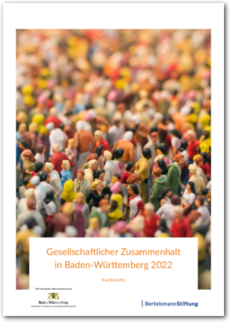How did social cohesion develop during the Corona pandemic? What are the differences in the population after two years of emergency? What is the situation of young people? These and other questions are addressed in the study "Social Cohesion in Baden-Württemberg 2022". It shows that cohesion declined significantly during the course of the pandemic and that younger people in particular were more severely affected by the crisis.
For the study, a total of 2,716 people were surveyed online from Dec. 9, 2021, to Jan. 4, 2022. The results of this survey were compared with findings from previous studies conducted in 2017 and 2019. This makes it possible to trace the development of cohesion longitudinally and to identify the effects of the pandemic.
According to the Bertelsmann Stiftung's concept, cohesion is composed of the three areas of "social relations" "connectedness" and "common good orientation."
The study was conducted with the kind support of the Ministry of Social Affairs, Health and Integration of Baden-Württemberg.
This publication is the complete long report, in which the results of the study are presented in detail. A German summary with the core results can also be found on our website.
Bertelsmann Stiftung (ed.)
Dr. Regina Arant, Dr. Georgi Dragolov, Prof. Dr. Klaus Boehnke, Dr. Kai Unzicker
Social Cohesion in Baden-Württemberg 2022
- Format Type
- Date of publication
- 01/09/2022
- Edition
- 1. edition
- Volume/Format
- 8 pages, PDF
Format
-
PDF
Price
Free of charge






